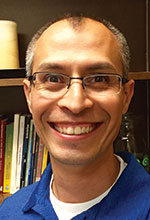Pastoral Ministry / Oscar Castellanos
IPI reminds us the universal Church is beautiful
(Espanol)
 In 2011, the vision of several people—including priests, diocesan staff and key leaders in the Archdiocese of Indianapolis—was fulfilled when the Intercultural Pastoral Institute (IPI) opened its doors to its first generation.
In 2011, the vision of several people—including priests, diocesan staff and key leaders in the Archdiocese of Indianapolis—was fulfilled when the Intercultural Pastoral Institute (IPI) opened its doors to its first generation.
In its first several years, there were programs aimed toward different ethnic communities like Burmese, African American and Latinos/Hispanics. Today only programs in Spanish continue. However, its energy and impetus, even during the coronavirus pandemic continue to remind us of the need for pastoral and leadership formation.
It all began at the Archbishop Edward T. O’Meara Catholic Center in Indianapolis. Later, it moved to the former St. Bernadette Parish on the east side of the city. Now, the central place is the school facilities of St. Andrew the Apostle Parish, also in Indianapolis.
Last year, through the Empowering Pastoral Leaders project and a Lilly endowment grant, the program was expanded to Holy Trinity Parish in Edinburgh and St. Mary Parish in New Albany.
As we contemplate the many blessings that IPI has brought, we cannot negate the intercultural realities it generates, hoping for a better understanding of who we are as a Church.
We do not have a course on the topic of culture; rather, it is embedded in our method and our pedagogy. Culture has a lot of meanings, or at least it could be perceived and interpreted in different ways. The United States Conference of Catholic Bishops define culture as: “The learned and shared values, beliefs and behaviors of a group of interacting people.”
In other words, culture shapes who we are. Race is inherited; culture is learned. Therefore, as we contemplate the tasks of pastoral ministries within our local Church, much of what we do and how we do it must look at the cultural components of the groups that exist.
When we speak of the impact of globalization, we understand that it creates interdependence in all aspect of our human existence. We rely on leaders, particularly pastoral leaders in our communities, with cultural competencies. They become desired traits and skills we look for.
Currently, the staff and instructors that collaborate at IPI come from several nationalities or backgrounds: Guatemala, Bolivia, Colombia, Venezuela, Peru, the Dominican Republic, Puerto Rico, Mexico, Mexican Americans and
U.S. residents of Cuban heritage. It has a good balance of laity and ordained, as well as men and women.
When we think of the participants of the different programs, we also see a great variety of backgrounds and countries from Latin America. This is the reality of our Church. Even though Latin American countries have similarities, it is important to distinguish their differences without losing their identity.
When we think of leadership, we envision formation that goes beyond learning about the faith and the teachings of the Church. At the heart of every program, we emphasize an openness to see the Church and the people we encounter with a different set of lenses.
Ethnocentrism is an impediment for that kind of growth. Professor Peter Northouse, the author of several books on leadership, defines ethnocentrism as “the perception that one’s own culture is better or more natural than the culture of others.” This is a natural and universal tendency. The kind of pastoral leader we promote is precisely the one who can negotiate the fine line between overcoming ethnocentrism and knowing how and when to remain grounded in their own cultural values and traditions.
Think about the many situations in our communities where there have been tensions and negative reactions toward cultural differences. IPI will continue to foster leaders to become more empathic and accurate in their understanding of their own culture as well as the rest of the body of Christ.
Understanding our own cultural biases and prejudices might initiate meaningful conversations about different styles and preferences in building up the Church. As a reminder of God’s grace during these nine years of service, many of IPI’s students who have completed the different programs now serve in different capacities.
There are laypeople serving as spiritual directors. Others are working as lay ecclesial ministers in parishes. Some men that completed the leadership program are now permanent deacons, and one is now in priestly formation for the archdiocese. As we continue this journey, the staff and the Office of Intercultural Ministry request your prayers and support.
Being a part of an intercultural community is challenging, but as the New Directory for Catechesis released by the Pontifical Council for Promoting the New Evangelizations says: “The service of inculturation of the faith to which every particular Church is called is a sign of the perennial fecundity of the Holy Spirit, who makes the universal Church beautiful” (#394).
(Oscar Castellanos is director of the archdiocesan Office of Intercultural Ministry.) †
 In 2011, the vision of several people—including priests, diocesan staff and key leaders in the Archdiocese of Indianapolis—was fulfilled when the Intercultural Pastoral Institute (IPI) opened its doors to its first generation.
In 2011, the vision of several people—including priests, diocesan staff and key leaders in the Archdiocese of Indianapolis—was fulfilled when the Intercultural Pastoral Institute (IPI) opened its doors to its first generation.